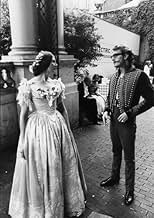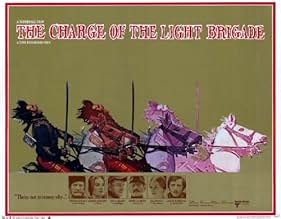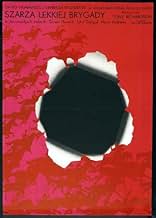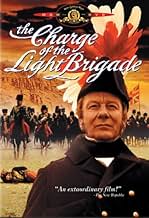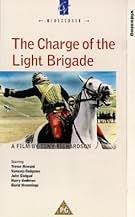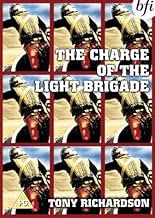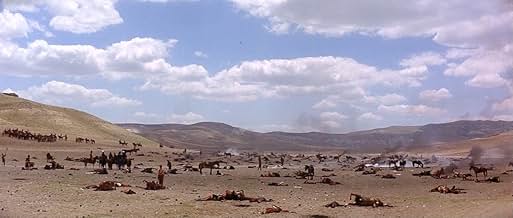IMDb-BEWERTUNG
6,6/10
4181
IHRE BEWERTUNG
Füge eine Handlung in deiner Sprache hinzuIn 1854, during the Crimean War, poor planning leads to the British Light Brigade openly charging a Russian artillery position with tragic consequences.In 1854, during the Crimean War, poor planning leads to the British Light Brigade openly charging a Russian artillery position with tragic consequences.In 1854, during the Crimean War, poor planning leads to the British Light Brigade openly charging a Russian artillery position with tragic consequences.
- Regie
- Drehbuch
- Hauptbesetzung
- Nominiert für 7 BAFTA Awards
- 7 Nominierungen insgesamt
John J. Carney
- Trooper Mitchell
- (as John Carney)
Howard Marion-Crawford
- Lt. Gen. Sir George Brown
- (as Howard Marion Crawford)
Christopher Cunningham
- Farrier
- (as Chris Cunningham)
Empfohlene Bewertungen
This movie was made in 1968 but I never got the impression from watching it that it was anti war. The movie was made entirely with British actors and a British director and the Brits never had an antiwar movement (because their government gave up its militarism after Suez in 1955). The movie depicts the British army as it existed in 1850. This was a period when one gained advancement in the army by money or title. It was a largely decadent and unprofessional army and the movie I think characterizes it rather well. In fact, Nolan wrote a book complaining about the need to professionalize the army but it took the near disastrous Crimean War to affect any serious changes (it too the British Navy another generation or more to make similar changes). At the time, there was a debate about the effectiveness of cavalry with some believing that no defensive position could withstand the full force of a disciplined cavalry charge--a left over from the Napoleonic Wars--while others thought a charge into artillery was near suicidal. Nolan's roll in the battle remains controversial and whether he delivered inaccurate verbal orders to Acrdigan to charge to prove the effectiveness of cavalry even against artillery or warn the brigade away has not been established because Nolan was killed.
As for the Crimean War, it also depicts the drum beat to war accurately and the implication that most of the dying was done by commoners and much of the death was caused by disease. It was an ugly war. What isn't shown is that the condition of the Russian army was far worse. The poor Russian peasant soldiers were sent to fight with smoothbore Napeolonic Era muskets with an effective range of perhaps 100 meters while the British and the French was new rifled muskets with a range of over 300 meters. In some battles very small forces of British held off huge numbers of Russians killing hundreds.
The Battle of Balaclave is generally depicted accurately. It was a calamity of errors. Capt Nolan actually lost his head during the charge and witnesses indicate that his horse continued running with corpse in the saddle for some distance before the body collapsed. The charge was initiated by the heavy Brigade led by Lord Lucan. There was a rivalry between Lucan and Lord Cardigan (brothers in law) and both brigades initially made the charge but the Heavies did not enter the Valley of Death. The Light Brigade continued into the Valley and were decimated but not wiped out. In fact they were supported by the French cavalry the Chasseurs d'Afrique and the Russian positions were in fact overrun. I think the charge as depicted in this movie is one of the most exciting I have ever seen captured in the cinema.
The so called Valley of Death has changed considerably since the 1850s. By 1994, it was entirely planted in vineyards and the only way to gain some sense of the battle is to find the famous Tractir Bridge over the Tchernaya River and follow the lines of hills. As for the town of Balaclava...I have a photograph of the town in 1854 with the British fleet anchored in the harbor. I took a photograph of this village in 1994 from just about the same angle as the 1854 image and then compared the two. The place is completely unchanged with even the stone buildings remaining. Of course, the village today is the base of the Ukranian Black Sea fleet and there is a not so secret submarine base cared into the limestone cliffs inside the harbor.
We may think that the Crimean War is ancient history but the people of Crimea do not. They have sort of a living museum called the Panaorma. This is a museum devoted to the siege of Sevastopol. There is a circular path and the visitor is engulfed by the on going battles on both sides of the path. One may wander the hills above Sevastopol and many of the rifle pits and trenches from the war remain (they were reused by the Russians during the unsuccessful defense of the city in 1942). It is a wonderful museum and it exemplifies the Russian attitude that history is alive and they don't forget their past.
This is a historically accurate movie. It moves a little slow at times and it has some amusing cartoonish graphics (almost reminiscent of Monty Python graphics). All the major players obviously have a great deal of fun with their rolls.
Anecdotes: Tony Richardson's two children, Nastasha and Joely are in the film as well is his sister in law Vanessa Redgrave. I think I have these relationships correct. Anyway, they are all related.
As for the Crimean War, it also depicts the drum beat to war accurately and the implication that most of the dying was done by commoners and much of the death was caused by disease. It was an ugly war. What isn't shown is that the condition of the Russian army was far worse. The poor Russian peasant soldiers were sent to fight with smoothbore Napeolonic Era muskets with an effective range of perhaps 100 meters while the British and the French was new rifled muskets with a range of over 300 meters. In some battles very small forces of British held off huge numbers of Russians killing hundreds.
The Battle of Balaclave is generally depicted accurately. It was a calamity of errors. Capt Nolan actually lost his head during the charge and witnesses indicate that his horse continued running with corpse in the saddle for some distance before the body collapsed. The charge was initiated by the heavy Brigade led by Lord Lucan. There was a rivalry between Lucan and Lord Cardigan (brothers in law) and both brigades initially made the charge but the Heavies did not enter the Valley of Death. The Light Brigade continued into the Valley and were decimated but not wiped out. In fact they were supported by the French cavalry the Chasseurs d'Afrique and the Russian positions were in fact overrun. I think the charge as depicted in this movie is one of the most exciting I have ever seen captured in the cinema.
The so called Valley of Death has changed considerably since the 1850s. By 1994, it was entirely planted in vineyards and the only way to gain some sense of the battle is to find the famous Tractir Bridge over the Tchernaya River and follow the lines of hills. As for the town of Balaclava...I have a photograph of the town in 1854 with the British fleet anchored in the harbor. I took a photograph of this village in 1994 from just about the same angle as the 1854 image and then compared the two. The place is completely unchanged with even the stone buildings remaining. Of course, the village today is the base of the Ukranian Black Sea fleet and there is a not so secret submarine base cared into the limestone cliffs inside the harbor.
We may think that the Crimean War is ancient history but the people of Crimea do not. They have sort of a living museum called the Panaorma. This is a museum devoted to the siege of Sevastopol. There is a circular path and the visitor is engulfed by the on going battles on both sides of the path. One may wander the hills above Sevastopol and many of the rifle pits and trenches from the war remain (they were reused by the Russians during the unsuccessful defense of the city in 1942). It is a wonderful museum and it exemplifies the Russian attitude that history is alive and they don't forget their past.
This is a historically accurate movie. It moves a little slow at times and it has some amusing cartoonish graphics (almost reminiscent of Monty Python graphics). All the major players obviously have a great deal of fun with their rolls.
Anecdotes: Tony Richardson's two children, Nastasha and Joely are in the film as well is his sister in law Vanessa Redgrave. I think I have these relationships correct. Anyway, they are all related.
Russia has invaded Turkey, much to the chagrin of the British, who sees this as a threat to their dominance of the globe through their Empire. As the politicians debate a course of action, the military prepare for war, recruiting men from the working classes and officers from the ruling classes. One such officer is Captain Louis Nolan, who comes under the charge of Lord Cardigan one of the old guard and a cantankerous, arrogant leader to boot. This form of leadership feeds through his officers and brings conflict with the straight approach of Nolan. This conflict reaches The Times and enrages Nolan, who continues his arrogance even as the Light Brigade join the forces heading through Turkey.
With stories of all manner of goings-on during the three year production of this film it is little wonder that in some regards this film is all over the place. I am unsure of the historical value of the writing but it doesn't manage to do much in regards characters or consistent tone (either in the film or the individuals). Nolan is a fine example of this as he never manages to be an engaging character and, along with the rest of them, just comes off as larger than life characters seemingly without any significant basing in reality. This makes it hard to get into as it seem to jump around in narrative without any real drive. This is all the more frustrating because on the edges it does do some things pretty well. From the very start there is a clear judgment on the English mentality the world policeman, the mighty lion, the posh officer mindset of war as a sort of game and so on. This is backed up pretty much by the rest of the film, which spends more time on this than on the characters, and it is interesting although maybe not enough to base a whole film on the animations alone are sharp enough to suffice if contrasted well with a reality.
The film may also be of interest recently because the most obvious parallel is now with the US's position in the world not quite an Empire but certainly with all the influence and invincibility that GB once believed it had. It is also relevant because it highlights the horrors of war and, even without characters we care about, the final charge is a mess of death that lacks any of the honour or beauty that the hillside generals talk of minutes before. Sadly all this is wasted in a messy film that cannot seem to get an even tone is Cardigan a worthless leader or a comedy character? Are we meant to enjoy the battles or be horrified by them? And what's to be made of Nolan's constant preachy dialogue alongside scenes of comic value? These major problems take away so very much from the film that it is hard to really stick with it and see what little good there is. The cast is made up of every British actor from the period who was between the age of 30 and 60. OK, maybe that is an exaggeration but at times it would have been easy for me to believe that. Hemming plays his character far too solemn and serious a problem when it makes his already poor dialogue sound like the ramblings of a pretentious fool. Howard has fun in his role but his is an one note performance that gets too close to a send up and confuses the tone of the film somewhat. Gielgud is good because he shows the same faults as Howard's character but does it without the overblown blustering. The support cast is made up of many British actors from the period but, without the material, many of them come and go without anything of value to add.
Overall this should have been a much more interesting and engaging film but it blows it with a messy structure, poor plot and uneven and confused tone. The harsh send up of 'the good IL' Empire' and the officer class is well done but is not enough to base the whole film on it should have been a subtext not the whole ballgame. Like another reviewer has said, it is funny that, given the years put into this and the sheer scale of the production that the most memorable and successful parts are the little animations that poke fun at the view this country once held of itself in themselves they are a warning to other would-be empires of our time.
With stories of all manner of goings-on during the three year production of this film it is little wonder that in some regards this film is all over the place. I am unsure of the historical value of the writing but it doesn't manage to do much in regards characters or consistent tone (either in the film or the individuals). Nolan is a fine example of this as he never manages to be an engaging character and, along with the rest of them, just comes off as larger than life characters seemingly without any significant basing in reality. This makes it hard to get into as it seem to jump around in narrative without any real drive. This is all the more frustrating because on the edges it does do some things pretty well. From the very start there is a clear judgment on the English mentality the world policeman, the mighty lion, the posh officer mindset of war as a sort of game and so on. This is backed up pretty much by the rest of the film, which spends more time on this than on the characters, and it is interesting although maybe not enough to base a whole film on the animations alone are sharp enough to suffice if contrasted well with a reality.
The film may also be of interest recently because the most obvious parallel is now with the US's position in the world not quite an Empire but certainly with all the influence and invincibility that GB once believed it had. It is also relevant because it highlights the horrors of war and, even without characters we care about, the final charge is a mess of death that lacks any of the honour or beauty that the hillside generals talk of minutes before. Sadly all this is wasted in a messy film that cannot seem to get an even tone is Cardigan a worthless leader or a comedy character? Are we meant to enjoy the battles or be horrified by them? And what's to be made of Nolan's constant preachy dialogue alongside scenes of comic value? These major problems take away so very much from the film that it is hard to really stick with it and see what little good there is. The cast is made up of every British actor from the period who was between the age of 30 and 60. OK, maybe that is an exaggeration but at times it would have been easy for me to believe that. Hemming plays his character far too solemn and serious a problem when it makes his already poor dialogue sound like the ramblings of a pretentious fool. Howard has fun in his role but his is an one note performance that gets too close to a send up and confuses the tone of the film somewhat. Gielgud is good because he shows the same faults as Howard's character but does it without the overblown blustering. The support cast is made up of many British actors from the period but, without the material, many of them come and go without anything of value to add.
Overall this should have been a much more interesting and engaging film but it blows it with a messy structure, poor plot and uneven and confused tone. The harsh send up of 'the good IL' Empire' and the officer class is well done but is not enough to base the whole film on it should have been a subtext not the whole ballgame. Like another reviewer has said, it is funny that, given the years put into this and the sheer scale of the production that the most memorable and successful parts are the little animations that poke fun at the view this country once held of itself in themselves they are a warning to other would-be empires of our time.
I do find it fascinating to come across obscure, almost forgotten films like this with familiar faces and famous actors in it. It was made ca. 1968, and in the true spirit of '68, it is strongly anti-war, anti-military, and anti-establishment, even though it is set in the Victorian era, the height of the Romantic age, when Military valor was largely celebrated. Military life is here portrayed in terms of ranks of men being bullied and brutalized by each successive rank above them, with the biggest, meanest and stupidest ones at the top.
I found it quite interesting to see the famous charge, celebrated in the romantic verses of Tennyson, portrayed in such a matter-of-fact manner as a series of tactical blunders due to bad communication and incompatible personalities among the commanders. These events were supposedly well-researched, and though I am not informed on the subject, I found this version of events very credible. Even with the high level of weapons and communications technology we have today, this sort of thing still happens. It must have been very common in centuries past.
To me, the dialog of this film and its delivery by the actors is its most remarkable feature. Seeing films that depict distant eras, I've often thought that these eras must have not just looked different from what we are used to, but sounded very different as well. If we were suddenly dropped into Victorian England, we wouldn't always understand what was being said or inferred to us. Words, phrases, gestures, facial expressions or body language that would have obvious meaning in that time and place would be strange to us. The language and syntax would, of course, be different, but so would the rhythm, pace, expressive color and accenting of the way people spoke. `Charge of the Light Brigade' does a remarkable job of not just looking, but sounding like a distant place and time. For a viewer who is not educated in antique British expressions and military jargon, as I am not, it makes watching this film a bit challenging, but it's like spending 130 minutes in the Victorian age as a so-called `fly-on-the-wall,' as the British put it. There was more than one line spoken after which I thought `say what?' But that's OK. It doesn't kill you, just encourages you to think a bit. This aspect of the film looks to be well-researched as well, a superb example of a somewhat talky script in which great care is taken with the language and its use by the actors. The script doesn't serve the purpose of an exposition device for the dumbest members of the audience, a very common vice in films, particularly big-money films engineered to alienate as few people as possible. It's an integral part of a design to recreate an unfamiliar time and place, and as such, a bit uncompromising.
I found it quite interesting to see the famous charge, celebrated in the romantic verses of Tennyson, portrayed in such a matter-of-fact manner as a series of tactical blunders due to bad communication and incompatible personalities among the commanders. These events were supposedly well-researched, and though I am not informed on the subject, I found this version of events very credible. Even with the high level of weapons and communications technology we have today, this sort of thing still happens. It must have been very common in centuries past.
To me, the dialog of this film and its delivery by the actors is its most remarkable feature. Seeing films that depict distant eras, I've often thought that these eras must have not just looked different from what we are used to, but sounded very different as well. If we were suddenly dropped into Victorian England, we wouldn't always understand what was being said or inferred to us. Words, phrases, gestures, facial expressions or body language that would have obvious meaning in that time and place would be strange to us. The language and syntax would, of course, be different, but so would the rhythm, pace, expressive color and accenting of the way people spoke. `Charge of the Light Brigade' does a remarkable job of not just looking, but sounding like a distant place and time. For a viewer who is not educated in antique British expressions and military jargon, as I am not, it makes watching this film a bit challenging, but it's like spending 130 minutes in the Victorian age as a so-called `fly-on-the-wall,' as the British put it. There was more than one line spoken after which I thought `say what?' But that's OK. It doesn't kill you, just encourages you to think a bit. This aspect of the film looks to be well-researched as well, a superb example of a somewhat talky script in which great care is taken with the language and its use by the actors. The script doesn't serve the purpose of an exposition device for the dumbest members of the audience, a very common vice in films, particularly big-money films engineered to alienate as few people as possible. It's an integral part of a design to recreate an unfamiliar time and place, and as such, a bit uncompromising.
Tony Richards was an ideas man, in some loose sense a lot like his contemporary 60s director Richard Lester. The two of them were mavericks, often eschewing traditional and reliable modes of film making in preference to trying out unchartered techniques - born out of nothing else but their own imaginations. Lester did this to achieve an original knockabout and racy product, and Richardson did it to achieve a more stark and poignant effect for the supposed thinking-man's 'swinging' audience of the time. However, not all these ideas worked well in practice. The Charge of the Light Brigade is an example of one of these misfires.
The film is a classic piece of late sixties film making; both in the bizarre arty techniques used, and in the bold anti-war message. The idea of the film is to shamelessly point out the blind arrogance that lies behind the decisions made by those at the top to go to war. Arrogance, the film conveys very clearly, which is based purely upon blissful ignorance. The audience is invited to feast upon the bumbling Lord Raglan (John Gielgud), who nonchalantly sits at his desk in the war office and calls the shots based only on his devotion to England's great past, rather than on any rational thought. We meet, and are disgusted with, Lord Cardigan (Trevor Howard) whose arrogance is the driving force behind all he does. He believes that he is always right no matter what, simply because as the captain he is in charge. He's more concerned with what his men drink out of in the mess, and punishing them for their wrongdoings, rather than on running a well oiled military machine. To him, he is the most important part of that machine.
In contrast to these men is Nolan (David Hemmings), an idealistic military man with 'principles'. He believes in good sound leadership and decision making, and as such is constantly at odds with the stuffy and arrogant attitudes of his superiors - they are always right and he should speak when he's spoken to, even if he has a valid idea. Note Lord Raglan's line: "It is a sad day for Britain when her officers know too much what they are doing." Nolan is the man trying to fight vainly against the ignorance-entrenched system.
All this happens to the backdrop of Britain choosing to join in on a foreign war - to save Turkey from Russia. It is a war Engalnd should not have been involved in, but the arrogant big wigs made the decision to go. In true 60s anti-war style, the arrogance of those in charge of the war machine brings about its own destruction. Nolan was right, Raglan and Cardigan were wrong and didn't care to accept that, the light brigade was lost, and a blaming game ensues. While riding over the corpse of Nolan, Cardigan threw the blame on Lord Lucan, Lucan in turn threw the hot potato to Raglan, and Raglan laid the blame on the poor innocent man who wrote the order that Raglan himself dictated to him. As such, the pointlessness of war, and the destructive capability of blind ignorance based on an arrogance derived solely from power was brought forth clearly.
However, the directing techniques to bring this powerfully stark message to life were not up to the task. Too many dreamy sequences were used which just distract the audience; the script was at times just downright boring; and too often, in the director's eagerness to achieve an arty effect, the powerful meaning of an entire scene was lost. It is one of those films that you really have to pay attention to and concentrate on the whole way through; and this isn't just because The Charge of the Light Brigade is a thinking-man's film, it is because the meaning of many of the scenes is hidden, shrouded behind quite a bit of self-indulgent (or imaginative) imagery. Too often Tony Richardson's 'ideas' simply confuse the audience.
However, as I have said, the film does have a point to make, and this point is evident to all at the end of the film, no matter how many scenes were a little too cryptic. Therefore the film was successful. In addition, there were many great scenes, such as the one where Lord Raglan rides straight through a peaceful anti-war demonstration on his horse, destroying banners and calling the demonstrators traitors. The scene where the British soldiers were seen dying of heatstroke on the plains before even reaching Sebastopol was done well, especially when the scene cut straight to London, where it was reported in the newspapers, untruthfully, that Sebastopol had already fallen. This scene went straight for the jugular in its anti-propaganda and anti-government stance. And of course there is the brilliant period animation showing England as the saviour of the world, and the encourager of world industry and prosperity. These animations contrasted beautifully with the scenes of petty bickering and war-mongering in Lord Raglan's corridors of power.
A great cast and a stark and powerful idea make The Charge of the Light Brigade an interesting film, and at least a good production. The film still rings through in todays international and political climate, and especially shows how not so far we have come, and how many mistakes we have not learned from since the 1960s, and even since the 1850s. However, a sharper script and clearer direction would have helped immeasurably, and would have probably transformed this film into a classic powerhouse, rather than the languishing near miss it is. 6/10
The film is a classic piece of late sixties film making; both in the bizarre arty techniques used, and in the bold anti-war message. The idea of the film is to shamelessly point out the blind arrogance that lies behind the decisions made by those at the top to go to war. Arrogance, the film conveys very clearly, which is based purely upon blissful ignorance. The audience is invited to feast upon the bumbling Lord Raglan (John Gielgud), who nonchalantly sits at his desk in the war office and calls the shots based only on his devotion to England's great past, rather than on any rational thought. We meet, and are disgusted with, Lord Cardigan (Trevor Howard) whose arrogance is the driving force behind all he does. He believes that he is always right no matter what, simply because as the captain he is in charge. He's more concerned with what his men drink out of in the mess, and punishing them for their wrongdoings, rather than on running a well oiled military machine. To him, he is the most important part of that machine.
In contrast to these men is Nolan (David Hemmings), an idealistic military man with 'principles'. He believes in good sound leadership and decision making, and as such is constantly at odds with the stuffy and arrogant attitudes of his superiors - they are always right and he should speak when he's spoken to, even if he has a valid idea. Note Lord Raglan's line: "It is a sad day for Britain when her officers know too much what they are doing." Nolan is the man trying to fight vainly against the ignorance-entrenched system.
All this happens to the backdrop of Britain choosing to join in on a foreign war - to save Turkey from Russia. It is a war Engalnd should not have been involved in, but the arrogant big wigs made the decision to go. In true 60s anti-war style, the arrogance of those in charge of the war machine brings about its own destruction. Nolan was right, Raglan and Cardigan were wrong and didn't care to accept that, the light brigade was lost, and a blaming game ensues. While riding over the corpse of Nolan, Cardigan threw the blame on Lord Lucan, Lucan in turn threw the hot potato to Raglan, and Raglan laid the blame on the poor innocent man who wrote the order that Raglan himself dictated to him. As such, the pointlessness of war, and the destructive capability of blind ignorance based on an arrogance derived solely from power was brought forth clearly.
However, the directing techniques to bring this powerfully stark message to life were not up to the task. Too many dreamy sequences were used which just distract the audience; the script was at times just downright boring; and too often, in the director's eagerness to achieve an arty effect, the powerful meaning of an entire scene was lost. It is one of those films that you really have to pay attention to and concentrate on the whole way through; and this isn't just because The Charge of the Light Brigade is a thinking-man's film, it is because the meaning of many of the scenes is hidden, shrouded behind quite a bit of self-indulgent (or imaginative) imagery. Too often Tony Richardson's 'ideas' simply confuse the audience.
However, as I have said, the film does have a point to make, and this point is evident to all at the end of the film, no matter how many scenes were a little too cryptic. Therefore the film was successful. In addition, there were many great scenes, such as the one where Lord Raglan rides straight through a peaceful anti-war demonstration on his horse, destroying banners and calling the demonstrators traitors. The scene where the British soldiers were seen dying of heatstroke on the plains before even reaching Sebastopol was done well, especially when the scene cut straight to London, where it was reported in the newspapers, untruthfully, that Sebastopol had already fallen. This scene went straight for the jugular in its anti-propaganda and anti-government stance. And of course there is the brilliant period animation showing England as the saviour of the world, and the encourager of world industry and prosperity. These animations contrasted beautifully with the scenes of petty bickering and war-mongering in Lord Raglan's corridors of power.
A great cast and a stark and powerful idea make The Charge of the Light Brigade an interesting film, and at least a good production. The film still rings through in todays international and political climate, and especially shows how not so far we have come, and how many mistakes we have not learned from since the 1960s, and even since the 1850s. However, a sharper script and clearer direction would have helped immeasurably, and would have probably transformed this film into a classic powerhouse, rather than the languishing near miss it is. 6/10
I first saw THE CHARGE OF THE LIGHT BRIGADE in the late 1970s when it was broadcast on the Sunday night " Film Of The Week " slot . I liked it as a young child , then saw it several years later and wasn't quite taken with it mainly down to the fact that the first half is very slow and the second half is grim and depressing
After just seeing it again about ten minutes ago I still hold my second opinion . I will congratulate ( With reservations ) the production team for making a very British type of historical epic , this is far more accurate than say ZULU which was ironically directed and co-written by a Hollywood film maker for a Hollywood studio and in that film Cy Endfield showed that perhaps you have to rewrite history ever so slightly to make a classic epic movie based upon actual events . Unfortunately by being as accurate as possible as a history lesson THE CHARGE OF THE LIGHT BRIGADE resembles the critically panned ZULU DAWN rather than ZULU which is in many film critics top ten movies including mine
We learn that many British officers in the Victorian British army bought themselves their rank causing serious friction with officers who were totally professional soldiers who achieved their rank through talent . We learn how calvarymen train , we learn what goes on in the officers mess , we learn that the Crimean war was the first conflict to get major press coverage but all this does tend to hold the story up . It may run for just over two hours but the movie feels much longer .
A cast member ( I can't remember which one ) was interviewed several years ago and she mentioned the production team's eye for detail so much that many of the cast honestly thought they'd been transported back to the mid 19th century . She also mentioned packed crowds watching the film in cinemas on opening night but the crowds had totally disappeared within a couple of days . You can't help but feel the attention to historical detail had everything to do with the poor box office . I guess the audience were expecting something in the vein of ZULU
As I said I will congratulate the production team for their accuracy in fine detail but bewarned it is top heavy with social comment and if you have little interest in history you might want to watch the latest Hollywood blockbuster instead
After just seeing it again about ten minutes ago I still hold my second opinion . I will congratulate ( With reservations ) the production team for making a very British type of historical epic , this is far more accurate than say ZULU which was ironically directed and co-written by a Hollywood film maker for a Hollywood studio and in that film Cy Endfield showed that perhaps you have to rewrite history ever so slightly to make a classic epic movie based upon actual events . Unfortunately by being as accurate as possible as a history lesson THE CHARGE OF THE LIGHT BRIGADE resembles the critically panned ZULU DAWN rather than ZULU which is in many film critics top ten movies including mine
We learn that many British officers in the Victorian British army bought themselves their rank causing serious friction with officers who were totally professional soldiers who achieved their rank through talent . We learn how calvarymen train , we learn what goes on in the officers mess , we learn that the Crimean war was the first conflict to get major press coverage but all this does tend to hold the story up . It may run for just over two hours but the movie feels much longer .
A cast member ( I can't remember which one ) was interviewed several years ago and she mentioned the production team's eye for detail so much that many of the cast honestly thought they'd been transported back to the mid 19th century . She also mentioned packed crowds watching the film in cinemas on opening night but the crowds had totally disappeared within a couple of days . You can't help but feel the attention to historical detail had everything to do with the poor box office . I guess the audience were expecting something in the vein of ZULU
As I said I will congratulate the production team for their accuracy in fine detail but bewarned it is top heavy with social comment and if you have little interest in history you might want to watch the latest Hollywood blockbuster instead
Wusstest du schon
- WissenswertesFilming was immensely problematic. Director Tony Richardson fired a stunt coordinator whose manic swordplay killed several horses. An earthquake destroyed the hotel used by the production. David Hemmings was extremely temperamental on-set. The crew and extras, many of whom were Turkish soldiers, fought verbally and physically with local villagers who resented their incursion into the area. Richardson's strange mixture of perfectionism and historical flippancy grated on both his crew and advisers. While filming the final battle, the soldiers were called away for a NATO war exercise, forcing Richardson to shoot the scene with only a few dozen stuntmen.
- PatzerThe character called Featherstonehaugh (played by Corin Redgrave) has his name pronounced more or less as it is written, with four syllables. An upper-class Englishman of the mid-19th century (or, indeed, today) would pronounce it "Fanshawe".
- Zitate
Lord Raglan: It will be a sad day for England when her armies are officered by men who know too well what they are doing - it smacks of murder.
- Crazy CreditsIn the animation over the opening credits, the English lion roars just as "A Woodfall Film" appears onscreen (mimicking Leo the Lion at the start of Metro-Goldwyn-Mayer movies).
- Alternative VersionenAlthough the cinema version was complete the 1993 UK video release was cut by 7 secs to edit footage of horse-falls. The 2008 Optimum DVD has the cuts length extended to 14 secs and features the 6 minutes shorter print as mentioned below.
- VerbindungenFeatured in Ein Pechvogel namens Otley (1969)
- SoundtracksThe Girl I Left Behind Me
(uncredited)
Traditional
Arranged by Trevor L. Sharpe
Heard before the Battle of the Alma
Top-Auswahl
Melde dich zum Bewerten an und greife auf die Watchlist für personalisierte Empfehlungen zu.
- How long is The Charge of the Light Brigade?Powered by Alexa
Details
- Erscheinungsdatum
- Herkunftsland
- Sprachen
- Auch bekannt als
- La carga de la brigada ligera
- Drehorte
- Pecenek, Türkei(charge in the Valley of Death)
- Produktionsfirma
- Weitere beteiligte Unternehmen bei IMDbPro anzeigen
Box Office
- Budget
- 8.000.000 $ (geschätzt)
- Laufzeit
- 2 Std. 19 Min.(139 min)
- Farbe
- Sound-Mix
- Seitenverhältnis
- 2.35 : 1
Zu dieser Seite beitragen
Bearbeitung vorschlagen oder fehlenden Inhalt hinzufügen


